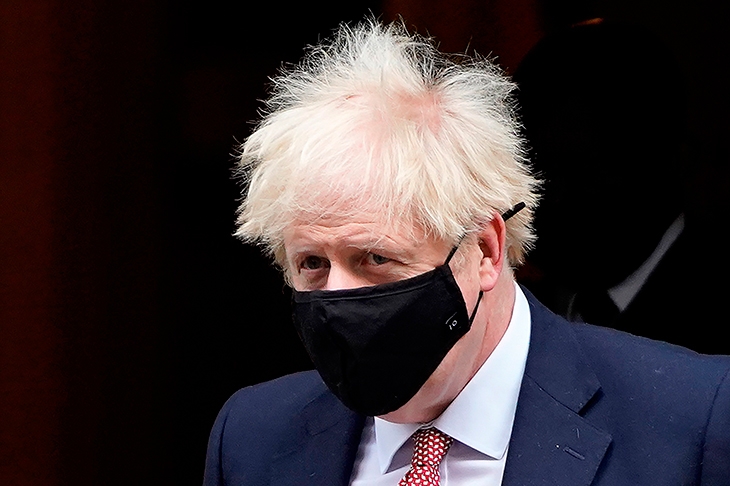The centrepiece of Boris Johnson’s speech to Tory party conference this year was his Damascene conversion to the merits of wind farms. Some people used to sneer and say wind power wouldn’t pull the skin off a rice pudding, he said — referring, of course, to himself, writing in 2013. Now, his post-Covid plan for Britain is wind farms powering every home by the end of the decade. But the Prime Minister was right first time.
When he was dismissing wind power, it was eye-wateringly expensive and was forecast to stay that way for the foreseeable future. No one envisaged, then, how global competition and technology would force prices down. The turbines being prepared for Dogger Bank wind farm, with their 100-metre blades, will be generating wind power at £40 per megawatt hour — less than half the price taxpayers will be charged for the Hinkley Point C nuclear plant under the deal disastrously negotiated by George Osborne.
If Johnson had run for party leader talking about wind farms, he would not have been elected. It’s not that the Tories are against them, it’s just that the energy revolution will happen anyway, globally, with or without government, and wind power is a pretty poor substitute for a vision when local high street shops are boarded up, jobs hang in the balance and children’s education is in tatters. What we need government to do is to preserve public services, minimise damage caused by Covid and start the job of social repair.
Now that the Prime Minister’s health is restored, he must devise a clearer plan and a clearer direction
The feeling inside No. 10 is that the battle is on to design the post-Covid world. The competing visions will be Labour’s state-driven agenda and a Conservative response looking to free enterprise. The Prime Minister drew out these battle lines explicitly, and committed himself to the latter. ‘We need the economic robustness to deal with whatever the next cosmic spanner may be hurtling towards us in the dark,’ he said. A country depending on debt and state spending will be far more vulnerable, especially if the Bank of England refuses to print money for the government to borrow.
The problem is that while he sings the praises of the market, he is expanding the government at the fastest rate in history. No country in the world has a bigger gap between state spending and the tax haul. Fiscal discipline in his government has collapsed: HS2 is going ahead at a projected cost of between £65 billion and £88 billion, but Lord Berkeley, former deputy chairman of the government’s independent review into the project, says it could climb to £107 billion. Some £500 million is being spent on buying a 3G satellite network that went bust. Public sector wages are being pushed higher at a time when inflation (and private sector wages) are falling.
The bill for this spending will, eventually, have to be paid. If the Prime Minister rules out spending reform — or ‘austerity’, as he calls it — then taxes will have to rise, which risks choking off the economic recovery on which he so rightly depends. This basic point is in danger of being forgotten by the Tory party more generally: that today’s spending is tomorrow’s tax rise. They cannot cheer on spending splurges today, and wish for a low-tax private sector-driven recovery tomorrow.
But after a miserable summer, there are signs of the Prime Minister making a political recovery. A Brexit deal looks increasingly likely, paving the way for a January cabinet reshuffle — resetting his team and his agenda. He has a difficult task ahead with the revival of the virus in the north of England: scientific advisers will be swarming him, urging him to lock down. It’s a difficult job to balance the threat of the virus against the harm that lockdowns inflict on economies, communities and public health.
It is also proving difficult to establish the efficacy of lockdown as a tool of controlling the virus, locally or nationally, both here and abroad. The ‘Rule of Six’ was introduced on the strength of the experience of Belgium — which this week introduced a ‘rule of four’ and closed bars and coffee shops in the capital.
National lockdown on 23 March had nothing like the effect predicted by Professor Neil Ferguson of Imperial College London, but this has not discouraged Boris from offering similar advice this time. Italy and Sweden have both been successful — at least for now — but by using very different techniques. With such mixed evidence, there is no clear way out.
After almost being killed by the virus, it is understandable that the Prime Minister has taken his time to recover. But now his health is restored, he must devise a clearer plan and a clearer direction. He must show that he understands that people are suffering and that he is ready to do what he can to help. For families who fear they’re about to lose their income, talk of more wind farms is utterly irrelevant.
People in Boris Johnson’s new northern heartlands need to know that real help is on the way. This, now, ought to be the Tory mission.






Comments